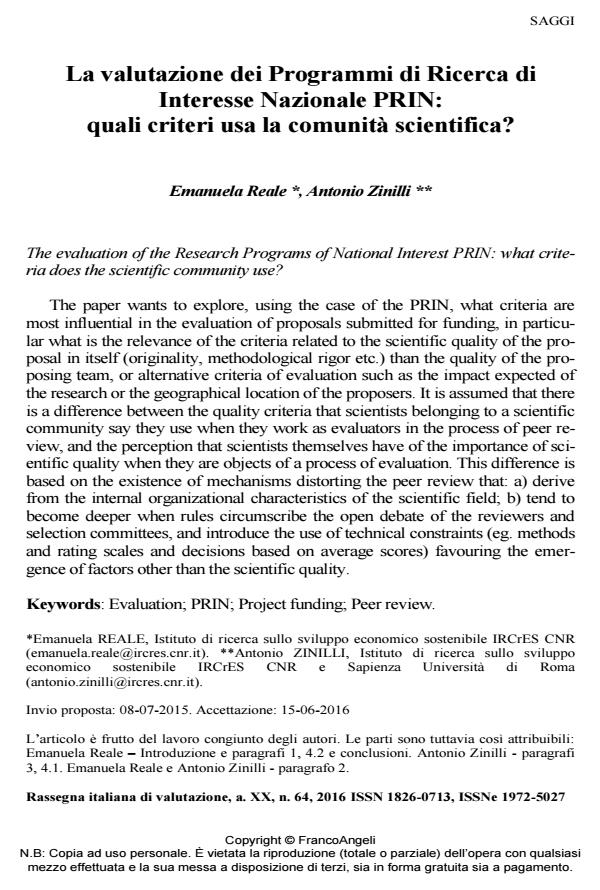The evaluation of the Research Programs of National Interest PRIN: what criteria does the scientific community use?
Journal title RIV Rassegna Italiana di Valutazione
Author/s Emanuela Reale, Antonio Zinilli
Publishing Year 2017 Issue 2016/64 Language Italian
Pages 26 P. 27-52 File size 1138 KB
DOI 10.3280/RIV2016-064003
DOI is like a bar code for intellectual property: to have more infomation
click here
Below, you can see the article first page
If you want to buy this article in PDF format, you can do it, following the instructions to buy download credits

FrancoAngeli is member of Publishers International Linking Association, Inc (PILA), a not-for-profit association which run the CrossRef service enabling links to and from online scholarly content.
The paper wants to explore, using the case of the PRIN, what criteria are most influential in the evaluation of proposals submitted for funding, in particular what is the relevance of the criteria related to the scientific quality of the proposal in itself (originality, methodological rigor etc.) than the quality of the proposing team, or alternative criteria of evaluation such as the impact expected of the research or the geographical location of the proposers. It is assumed that there is a difference between the quality criteria that scientists belonging to a scientific community say they use when they work as evaluators in the process of peer review, and the perception that scientists themselves have of the importance of scientific quality when they are objects of a process of evaluation. This difference is based on the existence of mechanisms distorting the peer review that: a) derive from the internal organizational characteristics of the scientific field; b) tend to become deeper when rules circumscribe the open debate of the reviewers and selection committees, and introduce the use of technical constraints (eg. methods and rating scales and decisions based on average scores) favouring the emergence of factors other than the scientific quality.
Keywords: evaluation; PRIN; project funding; peer review
- Gillet R.,(1991). Pitfalls in assessing research performance by grant income. Scientometrics, 22
- Gillies D. (2008). How should research be organized?. College Publication, London
- Hornbostel S., (2001). Third party funding of German universities: an indicator of research activity?. Scientometrics, 50
- Lamont, M. (2009). How professors think. Inside the curious world of academic judgment. Cambridge: Harvard University Press
- Langfeldt L., (2001). The Decision-Making Constraints and Processes of Grant Peer Review, and Their Effects on the Review Outcome. Social Studies of Science, 31(6):820-841
- Langfeldt L., (2006). The policy challenges of peer review: managing bias, conflict of interests and interdisciplinary assessments. Research Evaluation, 15, 1
- Langfeldt L. and Kyvik S. (2011). Reearchers as evaluators: tasks, tensions and politics. Higher Education 62:199-212
- Laudel G. (2006a). The ‘quality myth’: Promoting and hindering conditions for acquiring research funds. Higher Education, 52:375-403
- Laudel G. (2006b). The art of getting funded: how scientists adapt to their funding conditions. Science and Public Policy, 33:489 - 504
- Lepori, Benedetto, Besselaar, Peter van den, Dinges, Michael, Poti, Bianca, Reale, Emanuela, Slipersaeter, Stig, Theves, Jean, Meulen, Barend van der (2007) Comparing the evolution of national research policies: what patterns of change? Science and public policy, 34 (6). pp. 372-388. ISSN 0302-3427
- Reale E. (ed., 2008). La valutazione della ricerca pubblica. Angeli, Milano
- Reale E., Potì B. (2009). Italy: Local Policy Legacy and Moving to an ‘In between’ Configuration. in Paradeise C., Reale E., Bleiklie I., Ferlie E. (eds.). University governance. Western European Comparative Perspectives. Springer, Dordrecht, 77-102
- Reale E., Zinilli A. (2014). Evaluation processes in research grant allocation: what is the relevance of scientific quality?, paper presented at the 27th CHER Conference, Rome, 8-10 September
- Whitley R. (2000). The Intellectual and Social Organization of the Sciences. Oxford University Press: Oxford
- Whitley, B. E., Jr. & Kite, M.E. (2010). The psychology of prejudice and discrimination (2e). Belmont, CA: Thomson-Wadsworth.
- Ex-ante evaluation of research project funding: what is the importance of scientific quality? Emanuela Reale, Antonio Zinilli, in WELFARE E ERGONOMIA 1/2020 pp.29
DOI: 10.3280/WE2019-001004 - Interdisciplinarity in academic research? Evidences from competitive project funding Emanuela Reale, Antonio Zinilli, in WELFARE E ERGONOMIA 1/2020 pp.79
DOI: 10.3280/WE2019-001008
Emanuela Reale, Antonio Zinilli, La valutazione dei Programmi di ricerca di interesse nazionale PRIN: quali criteri usa la comunità scientifica? in "RIV Rassegna Italiana di Valutazione" 64/2016, pp 27-52, DOI: 10.3280/RIV2016-064003